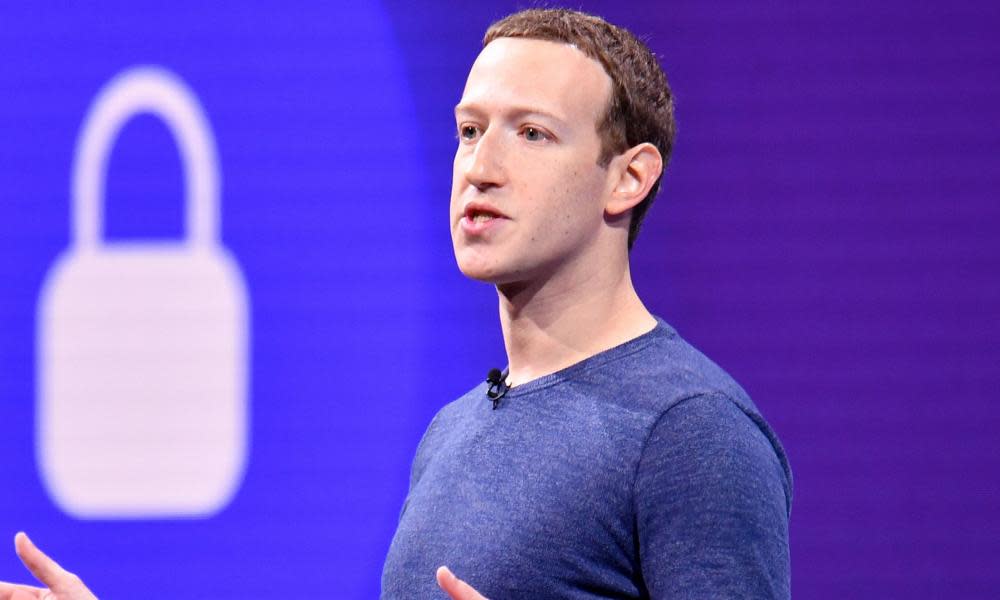Facebook plans to change its name as part of company rebrand – report

Facebook plans to make a dramatic break with its past by rebranding the company next week, according to a report.
Facebook’s founder and chief executive, Mark Zuckerberg, plans to talk about the name change at a company event next week but it could be unveiled sooner, reported the Verge, a US tech news website.
In a statement, Facebook said it “doesn’t comment on rumour or speculation”.
Under the plans, Facebook would change the name of its holding company but not that of its eponymous social media platform, known internally as the “big blue app”. As well as its founding site, the company also owns Instagram, WhatsApp and the virtual reality brand Oculus.
The Verge reported that the new name for the holding company could be linked to Horizon, a word used in at least two virtual reality products that the company is developing. Zuckerberg launched his company as TheFacebook 17 years ago.
Facebook is reportedly pondering a rebrand against the backdrop of its worst PR crisis since the Cambridge Analytica scandal three years ago. A former employee, Frances Haugen, has leaked tens of thousands of documents and gave a damning testimony to US senators in which she said Facebook put “astronomical profits before people”.
According to the Verge, VR is the driver of the mooted name change as the company focuses on building a “metaverse” as the cornerstone of a new growth strategy. The Verge reported that the rebranding announcement could take place at the company’s annual product conference, Connect, on 28 October, when more details about the metaverse are set to be unveiled.
Oculus products would be a key product in the metaverse, a loosely defined concept that involves people leading their social and professional lives and interacting with other people via VR headsets and through augmented reality, where a digital layer is placed on top of real life, as in the popular Pokémon Go game.
Facebook is developing a social virtual reality platform called Horizon Worlds as well as a virtual-reality meeting service called Horizon Workrooms. Nick Clegg, Facebook’s vice-president of global affairs, has said he now takes his Monday morning meetings in the metaverse with a virtual table and whiteboard.
Facebook says it has just under 2.8 billion daily users for its products but Zuckerberg is renowned for his focus on growth, which is driven by a fear that Facebook could be superseded by a digital upstart at any moment.
Facebook’s shares have performed strongly this year, up 25% since January, giving the company – which makes the overwhelming majority of its money from advertisers targeting its user base – a valuation of just under $1tn (£730bn). However, the company’s shares have fallen below their September peak.
Related: Facebook’s policing of vitriol is even more lackluster outside the US, critics say
Facebook faces significant pressure following the Haugen revelations. The former Facebook product manager, who left the company in May, told the US Congress that the company was harming children and destabilising democracies. Haugen has been behind the leak of a number of documents to the Wall Street Journal, including showing internal research revealing that 30% of teenage girls felt Instagram made dissatisfaction with their body worse.
In response, Zuckerberg wrote in a blogpost: “At the heart of these accusations is this idea that we prioritize profit over safety and wellbeing. That’s just not true.”
Facebook is also braced for a wave of further revelations after it posted a series of tweets this week accusing unnamed news organisations of planning a “gotcha” campaign against the company.
To those news organizations who would like to move beyond an orchestrated ‘gotcha’ campaign, we are ready to engage on the substance. - John Pinette, VP Communications
— Facebook Newsroom (@fbnewsroom) October 18, 2021
The company is fighting a number of regulatory and legislative battles, including an attempt by the US competition regulator to force a breakup of the business. Facebook was fined $5bn by the US Federal Trade Commission in 2019 for “deceiving” users about its ability to keep personal information private, after a year-long investigation into the Cambridge Analytica data breach, where a UK analysis firm harvested millions of Facebook profiles of US voters.
This month, Facebook, WhatsApp and Instagram went offline for five hours after routine maintenance went wrong, disrupting all of Facebook’s services including its own internal communications and physical security services.
“For more than five hours Facebook wasn’t used to deepen divides, destabilise democracies and make young girls and women feel bad about their bodies,” Haugen told Congress.
Facebook’s rebranding move, if it goes ahead, is not without precedent. In 2015, Google rebranded itself as Alphabet, reflecting its determination to break into new fields in tech such as self-driving cars.

 Yahoo Movies
Yahoo Movies 
